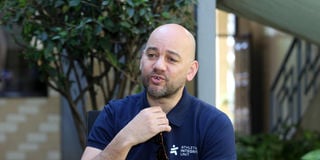Joint effort turning tide against doping menace

Athletics Integrity Unit’s Chief Executive Officer, Brett Clothier during the interview with Nation Sport at Riadha House, Nairobi on March 24, 2024.
What you need to know:
- This week, Athletics Integrity Unit’s Chief Executive Officer, Brett Clothier, gave insights on the changing trends of doping globally, and released interesting statistics with regard to doping cases in Kenya
- Clothier, who is back in Kenya to step up effort in the war against doping, said that international cases involving Kenyan athletes dropped last year as compared to 2022
- Clothier also disclosed that doping cheats are discovering new substances and practices to avoid detection by moving from the common Erythropoietin (EPO) to a new special form of EPO called serum
Combined effort from the government, Anti-doping Agency of Kenya (ADAK), and Athletics Integrity Unit (AIU) is turning tide against the doping menace.
This week, Athletics Integrity Unit’s Chief Executive Officer, Brett Clothier, gave insights on the changing trends of doping globally, and released interesting statistics with regard to doping cases in Kenya in 2022, and last year.
Clothier, who is back in Kenya to step up effort in the war against doping, said that international cases involving Kenyan athletes dropped last year as compared to 2022.
However, Clothier noted that local cases of doping went up last year compared to 2022, with testing having also been scaled up in the same period, with the Kenyan government having pledged Sh 650 million annually to the fight against use of banned substances.
A total of 38 athletes who are in AIU’s testing pool were banned in 2022, but the figures dropped to 29 in 2023 while locally, ADAK banned 34 athletes that had violated anti-doping rules in 2022 as the cases shot to 60 last year.
The rise in doping cases nationally is due to the fact that more testing was done in 2023 compared to 2022.
“We had 783 athletes being tested in 2022 but that was scaled up to a total of 3,185 last year, which informs why the positive cases were on the rise nationally than those international cases handled by AIU,” said Clothier.
This is a clear indication that doping cases involving top-tier races and top athletes taking part in gold label events like World Marathon Major races in London, Tokyo, Boston, Berlin, New York City and Chicago, have decreased.
The label races also include the World Championships across the board. However, the cases are going up in the second and third the marathon and road races where AIU and ADAK had not focused on in terms of testing.
Clothier warned that more national cases will be recorded this year with both AIU and ADAK widening the testing pool as they target not less than 5,000 tests this year, with Paris Olympic Games in mind.
Clothier also disclosed that doping cheats are discovering new substances and practices to avoid detection by moving from the common Erythropoietin (EPO) to a new special form of EPO called serum.
“They are also switching to using banned substances called transinoline and trimetazidine so as to avoid detection but we are smarter than them,” he warned.
Kenya got a huge reprieve to escape a looming ban during the World Council Meeting on November 30, 2022 in Rome, Italy, after the Kenyan government pledged US$ 5 million (Sh650m) annually to fight the doping scourge.
Kenya has been in Category ‘A’ of nations where doping is most prevalent since 2017.
“The project is on track and bearing fruit but there is a long way to go though. It’s one year since we started,” said Clothier, noting that the immediate gains have been due to the huge testing domestically, which was the important missing piece.
“The AIU had for the last few years been testing top international athletes and getting many cases on top of the pyramid. There was not enough testing in the second and third tiers below these athletes, which created an unfair environment,” said Clothier.
Clothier said that it is now their responsibility to ensure that the very best athletes are not under pressure from unfair competition domestically from drug cheats.
“I am glad to announce that ADAK is on the way to creating a very strong anti-doping framework. We are not there yet but we are on the right track,” said Clothier, adding that enhanced testing is now acting as a deterrent factor in the fight against doping.





